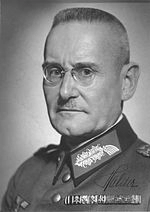How to Pronounce Franz Halder
#50
Most Popular
Boost
Jun 30, 1884 Würzburg, Bavaria, Germany Died on 02 Apr 1972 (aged 87)
German general
CancerFranz Halder, Date of Birth, Place of Birth, Family, Facts, Age, Net Worth, Biography and More in FamedBorn.com

German general
Cancer